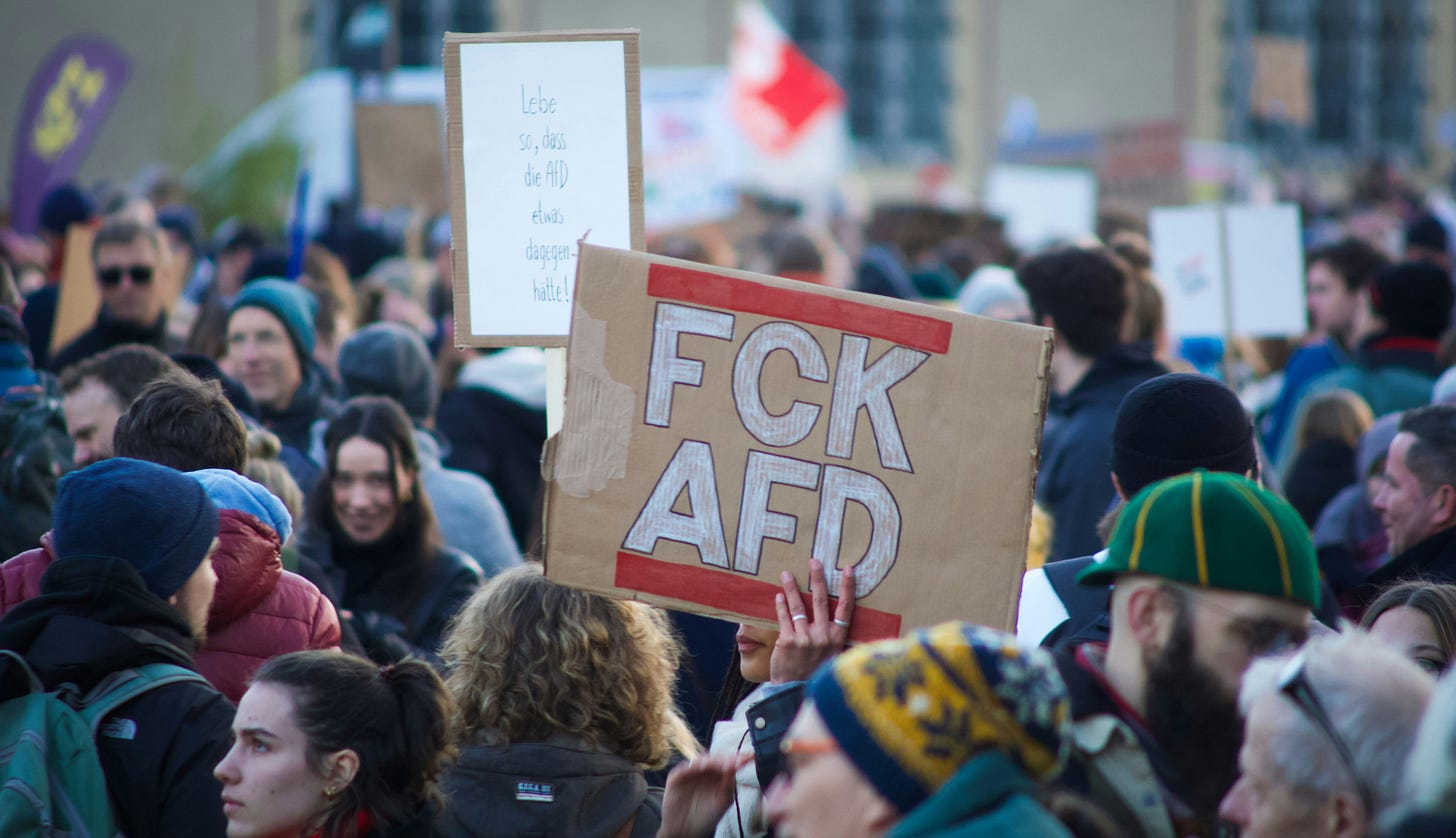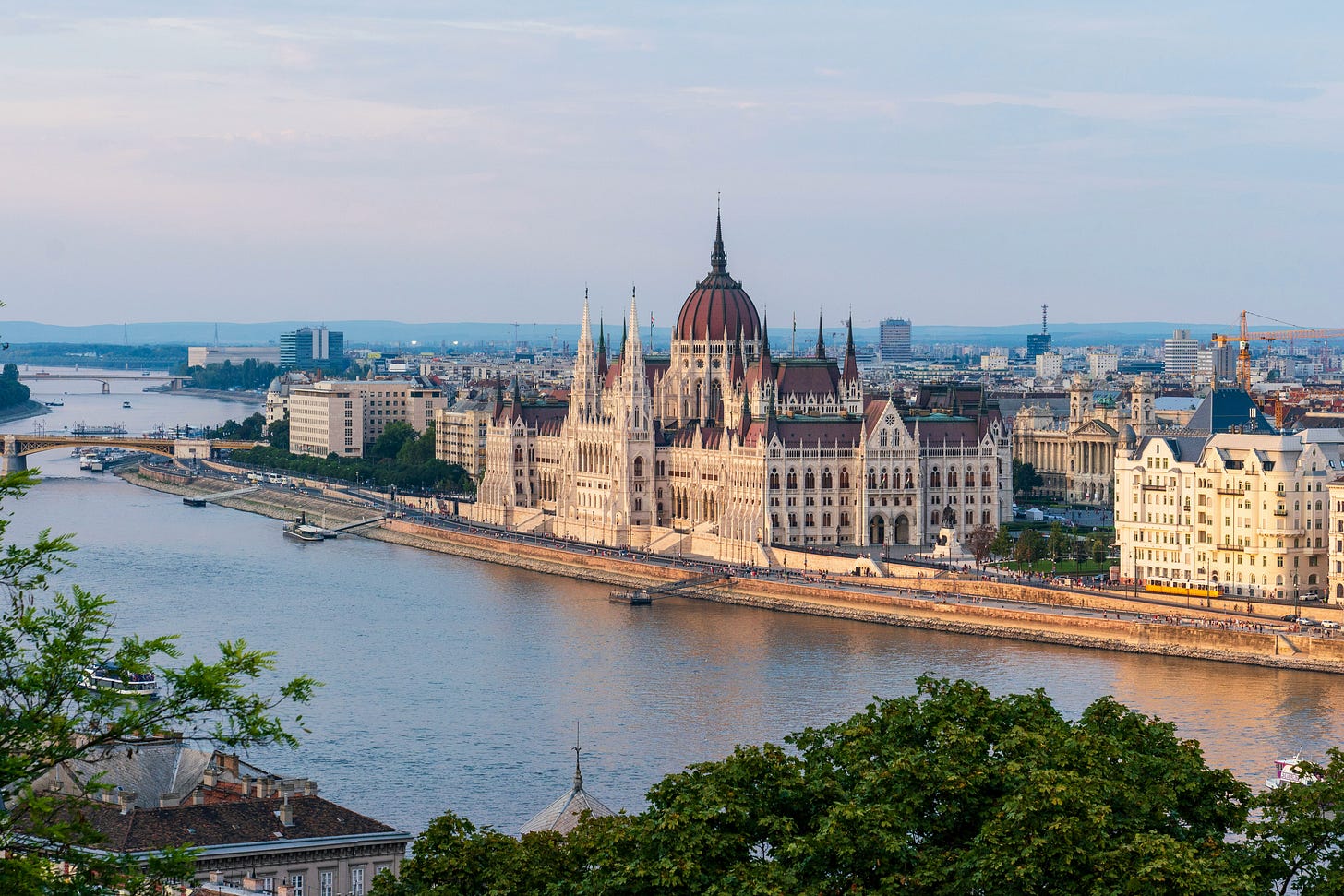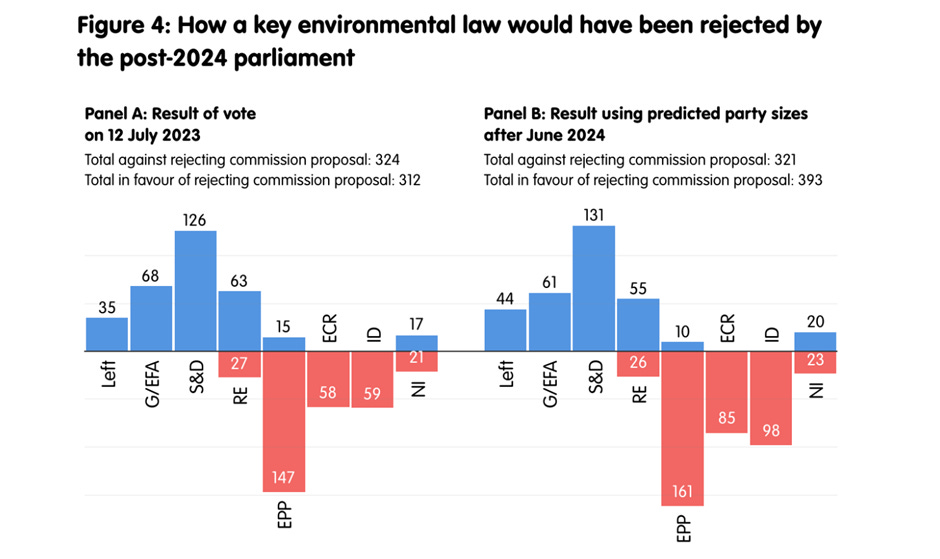What Happens When You Elect the Far-Right
With current polling showing the far-right on course for nearly 25% of seats, we take a deeper look at what this means in different policy areas in Newsletter #2.
In Brussels Dispatches first newsletter, I wrote about the general importance of voting in European elections in June. In this week’s newsletter, the focus will be on diving deeper into what an expanded far-right bloc will mean in key EU policy areas.
After the last few weeks, where hundreds of thousands of Germans have taken to the streets to protest a secret meeting held by the German far-right party Alternative für Deutschland (AFD), it feels especially appropriate to discuss the far-right and what their potential rise means for this continent. The fact that this meeting, which centred on ‘remigration’ and mass deportations, took place in Potsdam, a stone’s throw from where the Nazis held their Wannsee Conference, makes it even more haunting.1

As mentioned previously, if current polling holds true, we will see nearly a quarter of seats in the European Parliament go to Eurosceptic nationalists. Before going any further, it’s important to note that these parties do not necessarily form a united bloc. The two main right-wing political groups (the European Conservatives and Reformists Group (ECR) and the Identity & Democracy Group (ID)) have failed to merge several times due to differences on Ukraine, migration and domestic policies.
Nonetheless, these two factions have worked together to weaken a number of important pieces of legislation over the last five years as well as dragging the rhetoric of the EU to the right. Below, I will look at two separate policy areas which might be affected by a rise in the far-right in June and what this might mean for the EU.
The Environment
One of the loudest and most obvious messages of far-right politicians across Europe is that they will protect ordinary citizens from the ‘Brussels woke climate agenda’ or similar rhetoric.2 When the President of the European Commission Ursula von der Leyen announced the European Green Deal in 2019, it set out a blueprint for a whole swathe of EU environmental legislation. Four years on, and despite many successes and historic moments, many of these pieces of legislation seem imperiled by rising ‘anti-green’ sentiment among voters.
Since 2019, the far-right (and increasingly the mainstream conservative European People’s Party) have consistently voted against much of this legislation. A recent paper by the European Council on Foreign Relations highlights this very clearly by using one of the most well-known recent cases.
The EU’s flagship Nature Restoration Law, which aims to restore degraded habitats across the EU, survived a vote in the Parliament by a mere 12 votes in July 2023. 324 MEPs voted not to reject the Commission’s proposal with 312 voting in favour of a rejection, which would effectively have killed the law. However, if the same vote were to happen in the next mandate, if current polling held true, it would have been comfortably rejected by a margin of over 70 votes.
So what might all this mean for the next 5 years?
As the Parliament and the European Union as a whole drifts further to the right, its likely that a number of things will happen. First, the EU is likely to reduce its ambition or in some cases seek to undo previously agreed legislation. One of the areas that is already getting such attention is the ban on combustion engines by 2035. Many pieces of EU Green Deal legislation with extended or delayed implementation may now be targeted and sought to be re-opened and watered down such as the Regulation on Land Use, Forestry and Agriculture (LULUCF) and the Carbon Border Adjustment Mechanism (CBAM). As the European Council on Foreign Relations paper states:
The significant shift to the right in the new parliament will mean that an ‘anti-climate policy action’ coalition is likely to dominate. This would significantly undermine the EU’s Green Deal framework and the adoption and enforcement of common policies to meet the EU’s net zero targets.
Secondly, the EU may lose its global environmental leadership role. The EU and its member states have been at the forefront of a number of the biggest successes at international climate conferences such as the 2015 Paris Climate Agreement. At the recent COP28 meeting in Dubai, the EU spearheaded the language on the phase out of fossil fuels. This lack of leadership would be dire for the future of our planet but also for the EU, which has prided itself on being a pioneer in environmental protections.
Human Rights & The Rule of Law
While the far-right don’t always work together in lock step on a number of issues, they tend to align when it relates to human rights and rule of law issues. When we use the rule of law in this context, it is in the sense that implies that every citizen is subject to the law. In countries such as Hungary, Slovakia and up until recently Poland, we have seen issues with the rule of law which ultimately lead to a denial of rights and corruption.

How does any of this affect the average citizen you might ask? Firstly, for the citizens actually living in those countries, a number of their basic fundamental rights are now threatened. The right to have a judge listen to your case, the ability to have something published freely in national media, equal access to government jobs. These are concrete, tangible issues and not just lofty rhetoric.
Secondly, for those not living in countries such as Hungary, there are also real and visible effects. The most obvious example is that Victor Orban and his circle continue to benefit from EU funding.3 Corruption, once it goes unpunished and unsanctioned, then becomes more difficult to stop. Similarly, when member states start to disobey EU law, this undermines the EU’s legal order in its entirety. That might not sound like such a bad thing to many people, nonetheless political instability often leads to economic instability and all the evils that come with that.
So what might all this mean for the next 5 years?
Just like the environment, human rights will undoubtedly slip further down the agenda should the far-right do as well as thought. ‘Cutting red-tape’ and labelling human rights as part of the ‘woke agenda’ will be the order of the day, even at the expense of citizens both in the EU and around the world.
According to the European Council on Foreign Relations noted that as a result of the increase of the far-right, it will be harder
“to hold the line against the continued erosion of democracy, rule of law, and civil liberties in Hungary and any other member state after June 2024.”
Votes on freezing EU funds to Hungary, abortion rights in Poland and the use of spyware in Greece will all be in jeopardy.
Looking Backwards to Look Forward
I fully understand that there will be many citizens (and potentially some readers) who fully and earnestly support the views on the above issues on the far-right. They are legitimately allowed hold their views, just as I have tried to show why I believe these are backwards steps.
Despite this negative sense of direction, there are reasons to remain hopeful. After the massive protests in Germany, recent polling has seen the AFD drop in popularity. An increasing number of Germans recognise the AFD as a far-right party and they “identified ongoing mass demonstrations against the far-right as the most important issue.”4
We have also been here before. The months leading up to the 2019 elections were filled with far-right leaders hailing a ‘new dawn’ in European politics. Yet, this surge failed to fully materialise. The multiple crises that the EU has faced over the last five years may play into the hands of many of these same leaders but there were also numerous crises leading up to 2019. Only time will tell whether or not we will see a repeat.
Nonetheless, just like last time, I urge everyone to ensure that they are registered, that they vote themselves and that they encourage everyone around them to vote.
For more information on why and how to vote, see links at the end.
As for Brussels Dispatches, we have some exciting news ahead. Pierre, our co-founder, will be launching his series ‘EU Faces’ in the coming week. With the aim of trying to ‘humanise’ the EU and the people that work there, this series will be made up of interviews with EU officials, politicians, journalists, activists and everyone else in the ‘Brussels bubble’.
https://www.theguardian.com/world/2024/jan/21/more-than-100000-protest-across-germany-over-far-right-afds-mass-deportation-meetings
A few examples:
https://www.politico.eu/article/why-the-dutch-election-result-spells-trouble-for-europes-climate-efforts/
https://www.dw.com/en/climate-protection-where-do-the-eus-right-wing-populists-stand/a-47699703
https://www.opendemocracy.net/en/can-europe-make-it/spains-vox-party-and-the-threat-of-international-environmental-populism/
https://www.bloomberg.com/news/articles/2019-12-17/orban-style-cronyism-turns-gas-fitter-friend-into-a-billionaire
https://www.reuters.com/world/europe/support-germanys-far-right-afd-reaches-six-month-low-after-protests-2024-01-30/#:~:text=Europe-,Support%20for%20Germany%27s%20far%2Dright%20AfD,six%2Dmonth%20low%20after%20protests&text=BERLIN%2C%20Jan%2030%20(Reuters),over%20the%20past%20three%20weeks.


